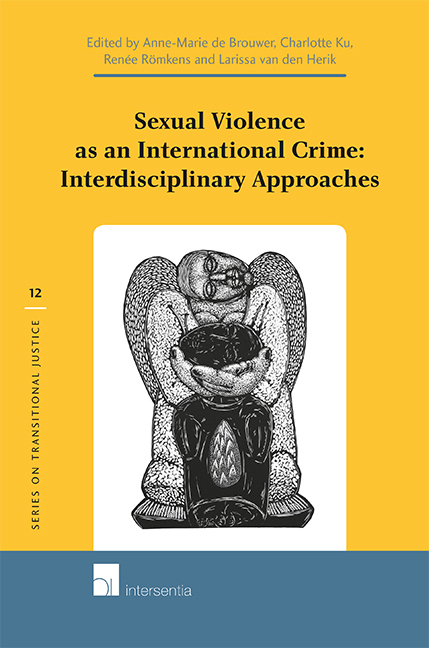Book contents
- Frontmatter
- Acknowledgements
- Foreword
- Contents
- Abbreviations
- INTRODUCTION
- PART 1 OVERVIEW OF SEVERAL MILESTONES AND CHALLENGES CONCERNING INTERNATIONAL CRIMINAL PROSECUTION OF SEXUAL VIOLENCE
- A HISTORICAL PERSPECTIVE, THE WAY FORWARD AND MILESTONES LONG OVERLOOKED
- THE INTERNATIONAL TRIBUNALS AND COURTS
- PART 2 SOCIAL, ARCHIVAL AND MEDICAL DATA COLLECTION AND ITS USE FOR THE CRIMINAL LAW PROCESS: METHODOLOGY ISSUES
- PART 3 SURVIVING SEXUAL VIOLENCE, STORY TELLING AND CREATING AWARENESS
- CONCLUDING REMARKS
- About the Contributors
Chapter 9 - Victims of Sexual and Gender-Based Crimes Before the Extraordinary Chambers in the Courts of Cambodia: Challenges of Rights to Participation and Protection
Published online by Cambridge University Press: 16 December 2020
- Frontmatter
- Acknowledgements
- Foreword
- Contents
- Abbreviations
- INTRODUCTION
- PART 1 OVERVIEW OF SEVERAL MILESTONES AND CHALLENGES CONCERNING INTERNATIONAL CRIMINAL PROSECUTION OF SEXUAL VIOLENCE
- A HISTORICAL PERSPECTIVE, THE WAY FORWARD AND MILESTONES LONG OVERLOOKED
- THE INTERNATIONAL TRIBUNALS AND COURTS
- PART 2 SOCIAL, ARCHIVAL AND MEDICAL DATA COLLECTION AND ITS USE FOR THE CRIMINAL LAW PROCESS: METHODOLOGY ISSUES
- PART 3 SURVIVING SEXUAL VIOLENCE, STORY TELLING AND CREATING AWARENESS
- CONCLUDING REMARKS
- About the Contributors
Summary
INTRODUCTION
The Extraordinary Chambers in the Courts of Cambodia (otherwise known as the ECCC or the Khmer Rouge Tribunal) was established pursuant to the Agreement between the United Nations and the Royal Kingdom of Cambodia. The ECCC started in 2006 with the first preliminary investigations by the co-prosecutors. ECC was established to prosecute crimes committed during the period of Democratic Kampuchea between 17 April 1975 and 6 January 1979. The ECCC has personal jurisdiction over senior leaders and those most responsible for serious violations of the Cambodian Penal Code, and the international crimes of genocide, war crimes and crimes against humanity. It is a hybrid court composed of national and international judges and staff, and it follows mainly civil law procedure. It is the first internationalized court dealing with mass crimes that allows victims to apply as civil parties and to become party to the proceedings alongside the prosecution and the defense. In Case 001, against Kaing Guek Eav (alias Duch), the former director of the security center, S-21, the Trial Chamber announced a judgment in July 2010. The judgment was appealed by all parties. On 3 February 2012, the Supreme Court Chamber pronounced the final judgment and sentenced Kaing Guek Eav to life imprisonment.
In case 002, against four senior leaders of the Khmer Rouge regime, indictments were finalized in January 2011 and the substantive hearing started on 21 November 2011. The case against the accused IENG Thirith was separated due to health reasons.
Cases 003 and 004 are strongly objected by the Cambodian government and are in the investigative phase.
In this chapter I will give (2) an overview on the participation rights and the protection scheme available for victims of sexual crimes, (3) an outline of the current situation at the ECCC with regard to sexual violence, (4) the challenges that victims face and (5) the lessons to be learned.
OVERVIEW OF THE PARTICIPATION RIGHTS OF AND THE AVAILABLE PROTECTION SCHEME FOR VICTIMS OF SEXUAL VIOLENCE BEFORE THE ECCC
PARTICIPATION RIGHTS
Victims of sexual violence, who apply to become a civil party and, therefore, a party to the proceedings, have to a large extent equal rights as appropriate like the prosecution and the defense.
- Type
- Chapter
- Information
- Publisher: IntersentiaPrint publication year: 2013
- 6
- Cited by

